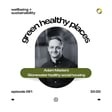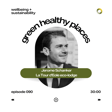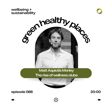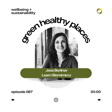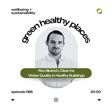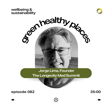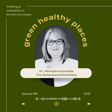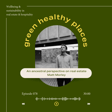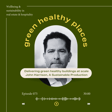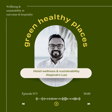Introduction to Wellbeing in Real Estate
00:00:00
Speaker
Welcome to Episode 70 of the Green Healthy Places Podcast, in which we discuss the themes of wellbeing and sustainability
00:00:08
Speaker
in real estate and hospitality.
Meet Neil Collins: Regenerative Real Estate Pioneer
00:00:11
Speaker
I'm your host, Matt Morley, and today I'm in the US talking to Neil Collins, co-founder and CEO of Latitude Regenerative Real Estate, a holistic real estate business based around the five key concepts of health and wellness, sustainability, community, ecology, and spirit.
Pathways in Real Estate and Wellness
00:00:31
Speaker
This conversation goes a little differently and in fact weighs in at double my usual running time effectively because Neil and I decided to go toe to toe interviewing each other and publishing the results on both of our respective podcast channels. So you'll hear much more of me than normal but you'll also hear about his journey from a world of non-profit to real estate brokerage and on into regenerative real estate. We look at concepts such as wellness real estate itself
00:00:57
Speaker
healthy buildings, but also a traditional wisdom, social justice, the role of ESG and community values in the property sector today. So we bounced around a bit, but this was a genuinely rich conversation. So let's get into it. Here he is, Mr. Neil Collins from Latitude. Hey, everybody. I am Neil Collins with the Regenerative Real Estate podcast and co-founder of Latitude Regenerative Real Estate.
00:01:23
Speaker
And I am Matt Morley with the Green Healthy Places podcast, founder of Biofit Gym Consultants and Biofilico Healthy Buildings.
Matt's Journey into Sustainable Real Estate
00:01:33
Speaker
Matt, this is a real treat. This is the first time, at least on the Regenerative Real Estate podcast, that we have had a simultaneous podcast go out. So it is awesome. I would love to just start it off taking the reins and asking you,
00:01:54
Speaker
What's your background and how did you get into doing green real estate, wellness real estate and the podcast?
00:02:04
Speaker
Yeah, well look, first of all, great to be here, great to connect. I think these transatlantic conversations can bring an extra layer of depth to what we both do. I think there's slightly different perspectives from pure geography and also exposures to different markets and clearly slightly different angles within what is broadly speaking the same industry, but we're obviously doing different things.
00:02:31
Speaker
My background is I spent the first five years of my life working for a consultancy that specialized in hotel brands, so we are very
Consulting and Entrepreneurial Challenges
00:02:41
Speaker
initial brand strategy for hotels and resorts, branded experiences, brand standard documents, and really getting under the skin of different luxury hotel and resort brands that then evolved into real estate. And from there, I ended up spending almost 10 years in-house with a real estate developer, building a mixed use real estate development in
00:03:07
Speaker
Europe on the Mediterranean coast. That was a combination of a marina, a landside, residential, commercial spaces. And yeah, in the end, I was essentially kind of like a creative director character working alongside the architects, construction teams, operations and marketing in developing micro businesses within
00:03:30
Speaker
wider context of this village development. So we basically built a town over a decade or so and there is nothing like working in-house for a fast-paced, high-powered developer to really get you up to speed on the realities of how to do these projects and how to make them succeed. And the only shift really for me there was that
00:03:55
Speaker
you know, this interest and passion for wellbeing on one side and then sustainability on the other. It just wasn't being nourished by that experience. There wasn't really a wellbeing strategy in place nor were they doing much by way of sustainability. You know, I just needed to scratch that itch. It just wasn't aligning with my value system. It was becoming quite clear that actually, you know, that's what I was put on this to do at least over the next decade or so. And I had to make the switch away. And that was when I launched
00:04:24
Speaker
to set up by myself. So very much from the inside stepping out and then adding in these additional pieces around sustainability and wellness and finding that niche which is now working as a consultant.
00:04:40
Speaker
alongside developers and resort and hotel brands with the perspective of having been on the other side of the equation and now looking from the outside in, but trying to deliver services in a way that keeps it lean and responds to their requirements as best I can. So I don't have huge teams and huge offices. It's me. Essentially, they're buying into myself plus one to two analyst consultants and designers, interior designers.
Neil's Shift to Regenerative Real Estate
00:05:09
Speaker
on each project. So that's how I'm set up. What about yourself? Tell me. Oh, yeah, man, we have we've got a lot of ground to cover then. My background was early on in the nonprofit sector, actually working for charity out of the UK, where we were doing whale shark research in the Maldives and in using that research to help inform marine protected areas and climate change adaptation policies.
00:05:36
Speaker
And that is incredible work. I loved every minute of it, especially getting to swim in the ocean every day. And that's where I really became really fascinated around community development and how do communities come together to create resilience. But I kept noticing that all the power dynamics, especially in a place like the Maldives was concentrated in the hands of the developers.
00:06:01
Speaker
It was quite lopsided. I ended up coming back to the United States thinking I was going to get a degree and then go back international and work in that arena.
00:06:13
Speaker
But I became interested in real estate and like you ended up getting on essentially as a consultant, helping to build large mixed use projects. These are kind of waterfront projects that you're creating 17 city blocks and the buildings are 50 to $300 million. And that was at a scale that didn't quite resonate with me for a long-term. I wanted to be more in control of the project that whenever you're
00:06:41
Speaker
position between the developer that's talking with private equity and the architects and you're having to redo everything on a minute by minute basis. That's whenever we decided, how do we invest in real estate and create the kinds of homes and really habitats that we believe in? And so we got really good and proficient at working with
00:07:05
Speaker
off-market properties and figuring out how to do creative finance. And that led into a portfolio where we had to manage it. And we went down this interesting path towards the service sector where because we were managing our own properties, we thought let's manage other people's properties. And so we put our heads down and started to grind for several years. And about six years later woke up with a fairly sizable property management company.
00:07:35
Speaker
we had started to help our clients buy, sell and trade properties. So we had gained about 20 real estate agents and
00:07:45
Speaker
It coincided with a time that our elders came down with terminal diagnoses around cancer. Another one had ALS, a couple had cancer.
Sustainability and Wellness Focus
00:07:56
Speaker
And whenever you're running something that you built that gives you no joy and actually sucks your energy and you have a family crisis going on, we went down this rabbit hole of realizing that, you know, it's the,
00:08:11
Speaker
materials that we're using to build with, it's how we're designing, it's the food that we're eating and the air that we're drinking and just found statistic after statistic that all boiled back to how do we design, manage and steward our place. And that's whenever we shut everything down and said, you know what, we have to figure out how to bring sustainability and wellness into our work.
00:08:36
Speaker
And we realized that in a la 2019, sustainability and real estate was much more focused in the United States around energy efficiency, electric vehicles, electrification, solar panels, and all amazing things. But it was not scratching the surface around our other tenements around community and ecology and health and wellness, and really the spirit of place so that that reciprocity that we can all have with
00:09:05
Speaker
creating life-giving habitats. And so that's whenever we jumped into the pond of saying, this is regeneration and our domain is real estate. So let's really start to jam on regenerative real estate.
Entrepreneurial Vision and Market Alignment
00:09:21
Speaker
And it's all been an amazing generative journey since then. And how, if I may ask, how clearly defined
00:09:30
Speaker
was the product and service proposition when you leapt in? Was it a case of understanding a market opportunity, understanding your own capacities and your team resources, the expertise you could bring and a way to fill that gap? And was it all pretty much in place when you set out or was it a case of feeling your way through and slowly figuring out what the market wanted or perhaps for there are a few wrong turns along the way? I think that
00:10:00
Speaker
that journey of entrepreneurialism is always a fascinating one. And I often have many people asking, how did you get to where you are? And certainly in my case, it was a very meandering path. So I'd be interested in here how you got to where you are. Yeah, I would say our journey is like that of a braided river. You can see where you want to go. It's almost palpable in my mind what kind of environments
00:10:29
Speaker
the industry needs to be creating not only single family homes, but we're talking apartment buildings and flats. We're talking commercial spaces, schools. And so we know that this is where we want to get. Now, how do we back back into that? And where is our expertise?
00:10:52
Speaker
We could have gone a couple of different directions. It could have been commercial where it sounds like you've really leaned into, but I've really enjoyed sitting down at the kitchen table with people and really trying to pull out from them. What is your vision? What do you need? What are those resources from financing to technical expertise?
00:11:14
Speaker
If people are aligned and they are driven by purpose of wanting to create and transform, that's where we've really found a lot of enthusiasm and then figuring out that there are other businesses and organizations that are so values aligned that we actually need them. And so our playbook has really been, how do we go find those others?
Real Estate Industry Challenges and Lessons
00:11:40
Speaker
How do we create that tribe and that ecosystem
00:11:44
Speaker
where the business model hasn't always been clear. I mean, transacting real estate can be pretty mind-numbing because the industry has only given the metrics of success as the more successful you are means the more clients that you're working with.
00:12:05
Speaker
And eventually you're gonna be able to outsource the things that you don't like to do to go open doors and to do contracts and to do marketing and you grow from there.
00:12:15
Speaker
there is no level of success that says, how do we work with clients to create habitats that we know are critically needed and to create that infrastructure right now? And so once we started to put out that message, I mean, it was the regenerative real estate podcast that was a method of inquiry to find these real estate professionals like yourself to say, Matt, what are you doing? How did you see this corner of the industry? And from there,
00:12:42
Speaker
it was real estate professionals from across North America raising their hands being like, I am so burnt out on the transactional nature of this industry. I came into it for financial reasons and financial freedom. But if I don't change my branding, if I don't change the approach that I'm taking, then I'm gonna exit entirely. And so we've really built off of that from jamming on the model of what does it look like as a real estate agent?
00:13:09
Speaker
So the buy and the sell, but we really bring in hardcore. What does it look like to help people transform? So with that, somebody that went into the commercial route, it sounds like you're working with larger developments. I saw that you have gyms and spas and things like that. Why?
00:13:34
Speaker
Why enter into that side? Like where was it a market that was telling you? Because I can certainly see a lot of dollars flowing through the commercial side of the industry. But what was it like for you, that jumping off point to go on your own?
00:13:52
Speaker
I think a lot of lessons have been learned over the last eight years or so since I stepped away from a full-time role in-house with the developer and it was a slow but steady transition from full-time to part-time just doing a few consultancy gigs.
00:14:14
Speaker
I remember very clearly a conversation with my then CEO saying, look, I've got this idea around creating a sustainable gym brand, basically like a green CrossFit. Nobody's doing it. Nobody's talking about the benefits of connecting nature and health and fitness within a movement space. So how can I basically come in and disrupt that market and create something for
00:14:39
Speaker
an emerging generation of more eco-conscious consumers who don't necessarily want consumers or exercises, in this case, who don't necessarily want the same product and service offer that most gyms, as I see it, they were offering. So I began with something that really doesn't resemble where I am today. I went from
00:15:00
Speaker
high level mixed use real estate development. So a combination of Resi and commercial and destination management, creating a destination. I then went right down to the other end of the spectrum with a micro business. So I was creating these micro businesses within the overall scheme of the mixed use development. I basically had an idea for one of these micro businesses of my own and went out to try and raise capital and set up what I thought would be a multi-site brand.
Biophilic Design and Business Evolution
00:15:30
Speaker
In the process of doing that, it became clear that I wasn't equipped for it. And in fact, I was in danger of going through all of this a couple of years of building a team and trying to raise capital and putting this concept together until you get to a point and you think,
00:15:52
Speaker
I'm just not sure what I'm trying to build is actually what I want to do. The idea is great. The concept and values behind it is great. But do I want to be the guy on the reception desk and even the world's greenest health and fitness club for the next two or three years? Because you're looking at the business plan and there isn't the cash in the cashflow model to pay someone else to do that.
00:16:16
Speaker
You know, two years in, I've done the work, I've sort of effectively created a pop-up space to create some proof of concept in London. In the process of doing that, remember looking at the budget plan for the few years and realizing that I was basically going to have to manage this thing. So I created a pop-up and managed the green gym in London for about a month. And you know, I hardly slept. I was going completely crazy doing just about everything that was required.
00:16:44
Speaker
And there were elements of it that were invigorating and others I just thought, this is this isn't me. I'm not suited for this type of work. I'm a combination of creative and strategy that that's actually what I want to be doing. I'm not the day to day operator, but I was trying to create a business that required a general manager day to day on the ground customer facing. And around about that same time, I got a call from
00:17:13
Speaker
gentlemen in Canada, Calgary, you become my first client saying, look, I've seen what you're up to. I like this pop-up space. I've got a new build that I'm developing here in Calgary. Could you come and do it for me?
00:17:26
Speaker
And one of the main lessons, the biggest lessons without doubt of the last eight years for me on an entrepreneurial journey has been listening and taking the cues and the hints and the tips that the market gives you. It's gold dust. That one call was a huge pivot away from owner operator model, own brand development model, which would have been a snail's pace to how can I help other people in this world
00:17:54
Speaker
of health and fitness where I was starting out to do similar things. So how can I create for them spaces that have some element of natural fitness of biophilia.
00:18:05
Speaker
of sustainability. So it was still relatively pure, but it was more of a service based offer rather than my setting up my own business. And really, that was where the shift happened. And then over the course of a couple of years, those projects went from being specifically health and fitness to we have a corporate office in Switzerland. We like what you do with all this biophilic design. There's not many people doing it. Could you do it for an office?
00:18:32
Speaker
And again, boom, light bulb moment. The second business Biophilico is born from that one corporate client that was sort of a natural foods business. But like, yeah, it was a huge food giant in Switzerland. It was all about nature and wellness. And they said, look, nobody's really specializing in this. We see something in what you're doing. Could you apply that to a different space? And, you know, sometimes you think, gosh, they've seen it before I did.
00:19:01
Speaker
And you just have to listen to those calls and emails because they really are, they're able to completely change your life if you know how to read into them. And so that was where the second business came from. So it was very much responsive to what the market needed. I was, in a sense, trying to push this concept through. Market wasn't ready for it. I'm not even sure it's ready for it now, but elements of that offer,
00:19:29
Speaker
had value in them and through a largely content-based marketing, sales and marketing strategy, that content got through to the right people that I needed to be talking to and they saw in what I was doing something that appealed to them and then it happened again two years on, three years after that it's happening again to me now where
00:19:49
Speaker
clients are ringing from, say, the hotel world and saying we see what you do in the world of hotels and resorts and residential real estate. We see that you do sustainability. Could you help us develop a market leading sustainability strategy and some sustainability standards for the brand?
00:20:06
Speaker
rather than doing any of this biophilic design. We like that you understand it, but we don't need that. We just need your thinking to put on your thinking cap and come and do some cerebral work for us. So, you know, pivot number three takes us to business number three, which will be green, healthy places.
Non-Traditional Pathways in Real Estate
00:20:22
Speaker
And, you know, it is that sense of, well, perhaps in a way I've gone from the micro
00:20:27
Speaker
slowly up to the more macro level now working at a strategic real estate developer slash hotel brand level. And it's a very different skill set in a sense, still a combination of creative and strategy, but far more on the strategic side. So, you know, I think for anyone starting out in this business, and I'll then flip this one back to you, but you know, people do ask, what's the best way in, you know, how do we,
00:20:57
Speaker
get in to do what you do. What do I study? What courses do I do? And I don't know how you see this, but I'm not sure there is one route in. You want to be a lawyer, you study law, you want to be a doctor, you go to a med school. To do what we do in this space, I think the interesting piece is that there are just any number of routes in.
00:21:20
Speaker
You can be a civil engineer and architect or someone like me more of a creative background, but if you can build up the experience and you have a passion, then you genuinely.
00:21:30
Speaker
share this value system that we all have developed in ourselves. If you want to be a part of that, there's space for you. There's space for you to play a role. That was spending some time reading into what you guys do on the website. I said, gosh, I haven't seen this. I just haven't seen anyone specializing in what you are doing. And you've created that little space. You've created that niche. So tell me, in terms of that,
00:21:57
Speaker
that background element, if you were then looking back out and seeing how people could potentially get into the industry today, what would be your, what recommendations might you be able to pass on to the next generation? Yeah, I think there's something in your story that I really identify with and I hope that people can look internally to say, if you get a call and they're saying Matt or Neil or Sarah,
00:22:25
Speaker
can you do this for me? Like you're putting this out, but we're looking for something a little bit different, but it's similar. If you get really excited about that gap that you're like, oh my goodness, I'm not exactly sure how I'm gonna do that, but I know that I can deliver and I'm up for the challenge. That is a sign of an amazing entrepreneur. And right now the playbook that we're going on
00:22:51
Speaker
is really follow our passion and follow that overarching purpose and realize that we have enough of an industry understanding of how construction works, how consulting works, how finance works, how transactions work, that we can start to break apart those different models and combine things to see if they work.
00:23:16
Speaker
And, and also realize that now is not a time to go out and try to compete with everybody, but it's to figure out who's in that field.
Role of Technology and Greenwashing in Real Estate
00:23:23
Speaker
How do we build the field together? And then how do we start to collaborate and the best word that I can really describe the.
00:23:33
Speaker
Our work is around how do we create interdependence with other people that either want to work on our brand, doing very similar things. So really updating this outdated model of the real estate agent, like technology will be interrupting the real estate agent model. Like it will reduce people. Well, it.
00:23:56
Speaker
The real estate agent will not even be opening doors in the future. There will be lock boxes for that. There already are. And shuffling paperwork between a buyer and a seller is going to go towards digital. We just won't be needed. And probably marketplaces will be open-ended as well, similar to what I've seen in Scandinavia, where there is a price, there is an open bid, and people are just bidding into it.
00:24:25
Speaker
So the US based market or industry for real estate agents, which is there's 1.5 million of us and they're all running around saying, let me help you sell your house for the most amount of money in the least amount of time. And let me help you buy your dream home. And it's an industry that represents the largest trade association in North America. That is in for a really rough ride. This is just my personal opinion. And so I think that
00:24:54
Speaker
if we are professionals in these arenas that require a general skill set, then where do we need to go? And that's why I say, hold where you know that the industry is headed and what do we need to do to get there? And there's so many different creative ways to do that. That's why I think it's
00:25:18
Speaker
It's so amazing to see the different business models that are coming up with right now like that that gives me so much inspiration to hear how you're putting it together and how other people are putting it together.
00:25:33
Speaker
because we need that and we need the simultaneous like raise the message, make sure that people are becoming aware that these options are out there. And I think at the same time, the market is increasing for that. I get really tired of people saying that what we're doing is the future of real estate because more and more it's, this is now, this is present. We need this more than ever and
00:26:02
Speaker
Um, I think it's a little bit tricky of like, how do we make sure that we're not green washing or well washing? Um, but really staying true to how do we work with those? We don't have to talk to everybody, but how do we talk to that sliver of the population or the businesses that are looking to create these kinds of experiences and places? Um, so I'm not sure if that, that rings true to you or not, but I am curious because wellness is one of those, um,
00:26:32
Speaker
topics that a lot of particularly commercial developers, I think that they're starting to watch the wellness real estate trend, but it's purely from this amenity. How do we provide this amenity like a spa so that we can call it wellness and then just increase our prices?
00:26:52
Speaker
So I find it a tricky, a tricky thing like there's a little bit of stickiness around wellness real estate, at least in the United States. And I'm curious what what your perspective is on that. Yeah, I'm very much seeing it now as a
00:27:08
Speaker
any brand or developer needing to go a lot further than just sticking in some wellness-oriented facilities. I think there's been a clear shift post-COVID to a more balanced mental and physical wellness consideration that before I think was probably more slanted towards purely physical.
Wellness Certifications and Design Innovation
00:27:29
Speaker
I think it is now much more, yeah, 50-50 in that sense. I think
00:27:34
Speaker
Yes, there are facilities and essentially with BiFit I'm delivering those facilities so it can be anything from a gym space to a yoga room, a meditation suite, an indoor basketball court. So those facilities that are ticking boxes but also getting people moving and active and
00:27:57
Speaker
establishing a mind-body connection. But if that's all it is, it can feel now in a competitive market, such as, for example, student accommodation, which is a boom sector right now in Europe. I'm working with a big brand there in the UK with seven or eight in the pipeline. And you need a complete comprehensive wellness strategy and a
00:28:21
Speaker
plan around not just even the healthy building, but going beyond that into how can you provide mental health support, what kind of content do people need within the residential context, in this case, students, so general offers, what are they going to, what could they benefit from in terms of not just having access to facilities, but also access to content and ways for them to be supported in their day to day life.
00:28:50
Speaker
And I think clearly there's the facilities themselves. Then you have the healthy building movement. And a lot of direction there is coming from the 360 degree healthy building certifications, obviously like well. But then these sort of micro certifications that are coming in that are slicing up, salami slicing that healthy building concept and just focusing on one thing, be that
00:29:20
Speaker
indoor air quality, for example, or active travel, active methods of transportation to and from a building that you're going to, you can get certified for that, you can get certified for indoor air quality, certified for the materials that you're using in an interior fit-out. So we have the big giants at the top who are trying to give a 360 view, and then we have a second generation of these
00:29:46
Speaker
healthy building standards coming through that make it a bit more accessible for developers to take a smaller bite of the pie. They both have roles to play. I think a lot of the benchmarks and the full leadership is coming from those certification schemes that really provide a lot of guidance. I think once you get into it, you can also see how perhaps you can go a bit further in some cases or how you can
00:30:15
Speaker
be creative about combining different credits and benefits and concepts in one space. And that's where it can get quite fun. So not just seeing these wellness real estate standards as a box ticking exercise and just about racking up credits and scores, but actually about what's the experience that we're delivering
00:30:38
Speaker
first and let's let's design the building or the spaces around that whilst having you know the the textbook open on your desk basically saying okay well yeah we want to get well platinum how can we do that but also let's not forget what the experience is like of being being in this building and therefore i think that's where the innovation can come from as well so wellness real estate healthy buildings
00:31:02
Speaker
and that combination of strategy and a plan that goes beyond just delivering spaces to actually considering how they work and how you can activate them and ensure that they stay active once the building opens. The last thing you want is to be well platinum certified and you've got a bunch of white elephant spaces that never get used because you didn't figure out how easy it was for people to move in and I don't know
00:31:29
Speaker
access the wellness lighting that's going on there and you know turn on the birth zone and the biphilic sounds and you've got five different controllers. The day-to-day reality of doing this stuff is that it's great. We need sound scent, we've got the lighting happening, we've got the healthy materials, we've got an indoor air quality monitor. How is the building management company dealing with five, six different things happening in each place?
00:31:55
Speaker
And so there has been this sort of barrage of information and concepts that have broadly fallen into the wellness real estate space. I think the next phase in that evolution is a synthesis in a sense and trying to perhaps focus on what's really making a difference in terms of the wellbeing of users, the occupants of that space. And I think that perhaps leads me onto a question, but for me,
00:32:25
Speaker
the idea of regeneration and going perhaps beyond sustainable real estate. I think now the line of sustainable, green and healthy, it's in the name of my podcast, but I think that line is no longer as clear as it was.
Regeneration and Ecosystem Contributions
00:32:45
Speaker
It's very much two sides of the same coin. But I think I'd be interested to hear how you see the concept of regeneration going somehow beyond
00:32:55
Speaker
established ideas of sustainability and how it can not just limiting the damage, right? It's as much as anything about doing more good, but what does that really look like in a single family residential context, for example? There's a fine line to this.
00:33:16
Speaker
The concept of good, good and bad, that's pretty subjective. We can all agree that what I think is good might not be good from your perspective. So I think that the simplistic graph that people will see of this is what conventional real estate looks like,
00:33:35
Speaker
And up and to the right, it's what green real estate looks like. And this is what sustainability looks like. And this is what regeneration looks like. It's about doing more good rather than less bad. That's a rallying cry that I think our brains, whenever we're used to really short bursts of media, can grasp onto. But I would like to make that distinction, that
00:34:01
Speaker
It's not really about doing less bad or more good, but it's about how do we use this site, this building, this project to help transform the whole. And it's like an acupuncture point in that regard. So it's trying to figure out what you can do to move past this linear equation that I think the industry really likes to put out there of net zero.
00:34:30
Speaker
Net zero what? So net zero energy, net zero water. Like where, where do we, where do we try to take this? And I really liked that concept of how do we move into net
Accessibility and Land Use in Wellness
00:34:41
Speaker
positive? How do we, how do we go past the restore to and revitalize too? Like we are now really embracing life giving. Um, and, and to your point earlier, what
00:34:57
Speaker
The same thing that I'm so skeptical about from the well washing and the green washing, it's almost like you need those commercial movers. I tend to be a little bit skeptical because I understand having to put together pro formas for these big projects, it's a formula of how do we increase our rent role
00:35:19
Speaker
Uh, so how do we sell amenities to our tenants like biophilic lighting and healthy indoor spaces and like nutritious food and employee programs and things like that. Uh, because that increases the net operating income of the building and it accordingly increases the value of the building. Um, but it there, so.
00:35:43
Speaker
That is translated into the US market, at least from one end of the market is really embracing kind of that wellness technology side that is really cool. That's really needed. I wish more and more people had the luxury to really think about indoor air quality and the materials that we're using. We've commodified our housing. So by the time that I'd say the mainstream population is actually able to get into a home that they can't afford,
00:36:11
Speaker
They don't want to know about EMFs. They don't want to know about healthy buildings. They are just glad that they have a home to live in. And maybe you can talk about paints that don't have as much fumes in them as another paint line.
00:36:31
Speaker
So I'm glad that there are those commercial movers that have the money flowing through them to create that market and that awareness. But at the other end, what I see as really being able to embrace what this concept of regeneration is, is through food and agriculture.
00:36:49
Speaker
And more and more people are saying, why the hell do we have all these lawns? Thank you to Britain for kind of showcasing the English garden to us, because that concept really took on. And now it's just these like huge toxic monocultured areas that more and more scientists are linking towards autoimmune diseases, sickle cell anemia, cancer is just proliferating, children below the age of 17 or 52% of them are
00:37:19
Speaker
are having to deal with chronic lifelong illnesses that are going to be combating for the rest of their lives. Our cancer rate has exploded in this country too, where, you know, a hundred years ago, it was like one in a hundred people by the mid 1970s was one in 20. Now it's one in two males are going to be developing cancer within their lifetime and one in three for females. So marginally better. But that is a direct correlation with
00:37:50
Speaker
How do we create an environment that's not going to require pesticides and it's actually going to bring back life because we're trying to encourage pollinators and we're not going to have to worry about what the supermarkets are stocking on the shelves and where it's coming from, from thousands of miles away, or even if it's a local conventional farm that sprays a bunch of crap on it. More and more people are really embracing this concept around ecological design and permaculture.
00:38:18
Speaker
And I see that being such an amazing mental model for people to understand what regeneration really is. And that's where more and more for the development side of things, we're seeing ambitious developers take these two models between a farm and particularly regenerative farming and housing and try to combine them. And they're tricky, but I see a lot of opportunity and
00:38:48
Speaker
and growth in that sector. I'm curious if that's going on within Europe or the UK and how the agriculture and the food piece is really informing the projects that you're involved in.
00:39:06
Speaker
Yeah, the answer is yes, it is. I'm seeing more of it happening in the hospitality space so around rural hotels that combine a let's say a short stay residential experience with
00:39:22
Speaker
essentially an agricultural setting where it's sort of farmed the table zero kilometers distance from the farm to the food to the kitchen and it's often hoteliers with well-stocked bank accounts, let's put it that way, who are able to take the lead and
00:39:46
Speaker
We are now starting to see some mixed use real estate or residential led real estate developments in the UK that are adopting a similar approach and saying, yeah, whether this we call it a flight to the land or just the shift in values.
00:40:01
Speaker
that's been especially obvious post-COVID in Europe as people start to think about what life could be like away from cities and then you do get into that interesting space of
00:40:18
Speaker
a symbiotic relationship.
Certification Standards and Project Interplay
00:40:20
Speaker
I think it flows both ways. There really is a lot to be taken from these larger scale commercial developments where, yeah, there's ESG funds way up there in the value chain pushing down and of course they insist on playing the game in terms of lead and well standards. And, you know, that's all great.
00:40:44
Speaker
That's great. And I think what I see there is as it trickles down through the industry to smaller developments, both on the residential side and in smaller mixed use developments, you know, often a developer is faced with the reality that is, that's an expensive process, not just to go through the certification itself, but to actually implement all of these different requirements is huge. And it's not always applicable to smaller pieces, but you can still take elements of it.
00:41:15
Speaker
The certification itself is great. It gives recognition. But when there isn't a huge ESG fund behind a project, then it's absolutely fine. And I've had this conversation many times now to take the lessons from the thought leaders.
00:41:34
Speaker
On the front edge, you have the money to do the research projects to do the in the deep dives in terms of pulling together the latest data behind this, you know, we can take elements of that and apply them to a smaller scale project. You don't have to do 10 out of 10. It's okay. But start with two or three.
00:41:54
Speaker
And and perhaps you know further down the line there's the scope to integrate more and you know costs come down around certain elements, you know i'd rather have that conversation with a. developer to say you don't have to be perfect, but please, if you can do two or three out of 10 let's do two or three out of 10 I can help you with that you don't need to certify it all of that can come later or never don't be limited by.
00:42:18
Speaker
what's happening in the other end of the industry where it is all so much more rigid, it has to be because there's far bigger numbers. So I see it flowing in both directions and I think that's where I get quite inspired by what's going on now. So whilst bigger developments feeding down into smaller ones and the smaller developments taking elements of what's happening elsewhere, but equally it can be those smaller, more agile developers or hoteliers, just one property
00:42:48
Speaker
you know, 15, 20, 25 rooms, 30 keys in a rural estate, but they're doing amazing things because that scale and their independence allows them to act fast and be agile and to create their own little idyllic worlds that can actually teach the bigger players a lot as well. And you know, that's where the magic is happening. If the two can start to feed off each other,
00:43:15
Speaker
so that they're not disconnected entities at opposite ends of the industry, but rather it can be this happy interplay of macro and micro complete 360 visions of health and wellness and sustainability, but also much more focused visions where it is an independent hotelier or real estate developer who just has this raw passion and interest in getting something done
00:43:44
Speaker
And that that one example can make a different reality possible. And I think, you know, the book unites a lot of people in this industry increasingly, I see is a shared value system. And so we do keep an eye out. There is a lot of interchange going on. There's a lot of
00:44:07
Speaker
Yeah, looking for sources of inspiration at different ends, different corners of the market and that dialogue, in a sense, what we're doing here and what your different guests, my guests do, and how they can connect them, that stuff is magic.
00:44:25
Speaker
it would be a shame if we lost that as this whole space gets bigger. I feel like it's at a size now where it's just manageable. Of course, it has to grow as it dissipates and spreads and connects with more and more of the market, but it's just at that point, maybe it's like a tipping point in a way, but it's just at the right size where
00:44:47
Speaker
Yeah, we can make connections and we can keep an eye on everything that's not everything, but much of what's happening in our industry and so much of the creativity at both ends of the spectrum can come together. And really that's what's pushing the whole game forward. And so I think there is no hard line down the center of this game, just as there is no vertical access between green and healthy, right?
Podcasting and Industry Networking
00:45:14
Speaker
a whole bunch of guests on your show. I wondered how that experience of connecting with people on the other side of the mic had perhaps influenced what you do and how it's pushed your business forward, or if there's been then opportunities to connect and interconnect guests. And that's certainly the experience that I've had and it's been very positive, but I wondered if you've had similar.
00:45:41
Speaker
Yeah, it's a blessing and a curse to talk with the industry leaders from around the world. We had a great architect on Amir Ayyub out of Egypt and that led me down a really interesting inquiry into what is it like to
00:46:01
Speaker
to think about wellness and regeneration within that kind of context. We've had some interesting guests on from the UK, not too many, but it's great to have you on and then a lot from North America. And the shiny object syndrome with me is real. You see what people are doing and go, oh my God, that's really cool. Let me do some of that. But I think some of the patterns that I really pick up on that I'm with you,
00:46:30
Speaker
The market size right now is pretty manageable. I would love to see that grow. Not selfishly, just as a matter of fact, like we need it to grow. But the big bottleneck that I'm seeing is that the financing is not quite there yet. Because we were talking about agriculture earlier and regenerative agriculture particularly, we see a lot of ESG funds and sovereign wealth funds that wanna get into this
00:47:00
Speaker
kind of land play to be springboarding biodiversity and all these great things, but the funds are so misaligned with the activities and the timelines and how that works. They really need the land to appreciate on a commodity basis. They really need tenant
00:47:22
Speaker
tenant farmers that don't have equity in properties with little say in how things really go to provide that cash flow for a 10-year fund horizon. On the residential side, we're really constrained that we have a great product in the United States for a 30-year mortgage that people can access.
00:47:43
Speaker
But outside of that, there's not a lot of additional funds if you want to transform a landscape or, I mean, there's been iteration within the solar panel world and things like that, but it still is pretty inaccessible for people. And so really looking at all these guests and seeing how they're making it work and iterating on their business models and really trying to figure out what is the right
00:48:12
Speaker
financing to unlock, where does the capital come from? There's a developer friend of ours named Aaron Fairchild, and he runs a really incredible cross laminated timber modular construction company. And he says, you know, we had to create a business that aligned with the capital sources.
00:48:35
Speaker
I've done something very different. We've created a business that did not align with capital sources and we've been forced to bootstrap and really kind of figure out what on earth we're talking about. And so I think that's really the underlying theme that comes from all these guests, great ideas, high passion, but when the rubber meets the road, how do we make it work in a market economy?
00:49:02
Speaker
is the question that I'm still sitting with. I mean, there's glimmers of hope from crowdfunding and getting away from just institutional or high net worth individuals.
Expert Collaboration and Ecosystem Building
00:49:13
Speaker
Blockchain and Web3 is like blows my brains wide open and I would love more people to help inform me of what the lay of the land is there and where that's going, like the tokenization and all that.
00:49:33
Speaker
That's the nuggets as well as the bottlenecks that I see. What about you? You have some incredible guests on. I love the diversity of your show because it's about sustainability, it's about wellness, and you've got healthy building biologists all over the board. What is that like being a podcast host with that array of expertise that comes on?
00:50:00
Speaker
Yeah, essentially I'm talking to businesses and brands that are contributing to creating greener, healthier spaces. So the parameters are that they are in some way to do with the built environment. But I think immediately it became clear that focusing, for example, just on designers or architects or construction companies
00:50:27
Speaker
that was really only a very small piece of a far wider concept now. So arguably the most listener friendly podcast episodes are the ones around pure biophilia. So if I do something on bio design or green rooftops or plant suppliers doing green walls and like really funky
00:50:55
Speaker
visuals that accompany it. You get a lot of hits on that one, but I think it's just as important to look at some of the, for example, like the technology that's coming through around smart building tech and how different companies are working to join the dots between the building's performance and data and building management. We've looked at
00:51:21
Speaker
air quality monitors and healthy building standards like reset, for example, which was more to do with air and now they're doing air materials and no matter of other things. Materials then led me down a separate path. We spoke to the Healthy Materials Lab out of New York and there's
00:51:39
Speaker
a whole range of healthy material suppliers out there now. I spoke to one in the UK called Master of Stuff who have real specialization in supplying exactly that healthy stuff. So there's so many different players and I think as much as anything it's
00:51:59
Speaker
In a sense responding to those those questions that come in. How can, how can I as as you know a student or young up and coming professional and what can they contribute and I think as much as anything, I'm trying to give a voice to the many different
00:52:17
Speaker
facets within this industry because there is an increasing number of products and services out there that are all becoming suddenly increasingly vital to what we do. And it's a very dynamic space. And there's both a combination of design-led pieces and brands. There's also a lot of tech innovation. And even through to content,
00:52:45
Speaker
So it may feel like we're on the outer edge of what classifies as contributing to a green and healthy space, but I do come back to it. The idea that building the building and handing it over, handing over the keys or handing over to a facilities management company or the operations company as the developer and then they step back, it's just not enough. It then becomes, well, how is the building
00:53:14
Speaker
operating and how is it living once it moves into the operational phase. So oftentimes we're looking at brands that are contributing to that experiential side. So that can be more content-based things such as biophilic sounds and apps that provide guidance on meditation and mindfulness. And so it is a broad spectrum, but
00:53:42
Speaker
It's very much informed by my being, you know, day in, day out up to my eyeballs in this stuff and the reality of having to often, to pick up on your point around collaboration, you know, for anyone working in this wellness, real estate, healthy building space, biophilic design consultancy, you know, it's oftentimes you're bringing other people to the table.
00:54:08
Speaker
because I'm not the expert in biophilic sounds. I need a guy for that. So you end up with a little black book of really great talented people who are experts in their own field.
00:54:23
Speaker
And it's just impossible to try, it's not advisable to try and fudge that. It's much better to be the guy that can bring the right person to the table at the right price, at the right time, with the right brief. And so often, it is a very collaborative process. It might be me and my small little team as a
00:54:44
Speaker
as a company, but we're then bringing other people in because there's just so many different components. And each one of those really requires a specialist. You want to make your own forest inspired indoor natural forest bathing scent. Well, you need an expert in that. And clients are
00:55:11
Speaker
I think increasingly aware that that's the way to get it done or to do it right.
00:55:16
Speaker
I wouldn't want to go down a path where you try to sort of bring all of that in-house. I think it's much better to let those respective suppliers do what they do and let them focus on that one little slice of the market and then be able to introduce them to each client as it comes. But that is, you know, I would say one of the more strategic benefits of having done this now for a couple of years with the podcast is that, yeah, you build that network, you're building a connection with
00:55:46
Speaker
people spending some time with them before, during, and after the call, you then suddenly do develop a list of, let's say, external partners that can then be introduced at the right time and place for client work going forward. And so, it's been perhaps an unexpected benefit of doing this, but it's become quite central to my work. I didn't know that it would go that way, but I think
00:56:16
Speaker
you're either trying to build a giant business and hire these people in, and then you become a little bit of everything, or you say, well, actually, I'm gonna stick to my lane on this, and that's what I can do. And here's where I think you need to bring experts in. There must be a component of what you do where you will be asked for advice on a specific piece of the regenerative real estate puzzle.
00:56:45
Speaker
And do you find yourself in saying, well, look, actually I have a guide for that, or is it easier sometimes to say, well, we can give you the top line as a sort of service that you provide for clients, or is it better from your perspective to be completely transparent and bring that person to the table? Or is there not much cool for that? Is it very specific when you do? So I love your model because there's a richness to play in the connector.
00:57:13
Speaker
And in being really transparent that you are the connector and the conductor of things, but you rely upon that network. And that's why I love the medium of podcasts because it's such an amazing opportunity, especially whenever our podcasts started in 2020. I mean, COVID restrictions hit.
00:57:37
Speaker
And you essentially were able to say, go to these innovative leaders and say, here's a microphone, do you want an opportunity to come on to the show so I think we had a little bit of an advantage. Whenever we started the podcast.
00:57:52
Speaker
potential that we have is all these values aligned businesses that are working in the areas where we have change agents. So they are licensed real estate professionals and now we're, we're even starting to expand where it is real estate professionals that want to be working in the arena of regenerative real estate.
00:58:12
Speaker
we really encourage them to go out and find those designers and architects and engineers and landscape designers and invite them into our ecosystem directory. And this is not a money-making thing. We don't charge any businesses to be in that directory, but there is so much that goes on when people
00:58:36
Speaker
are coming into our website and they are trying to figure out, well, how do I do this with a property that I own? They can go search those businesses in our directory and make connections that we don't even know about. Like I'll hear about them months or years later. And I think that's really cool. And it's also the exact same directory that whenever I get hired on as a consultant for a project, I'm going there and I'm saying, who do we know?
Global Trends and Social Justice in Real Estate
00:59:06
Speaker
in this region or with this expertise that we can draw from. So I get to draw from our change agent community and what expertise lies in that. And then I get to draw from our ecosystem directory and what skills are in there. And so I wanna put more emphasis on that going forward. But yeah, I mean, our business model is very similar. Like we play the connector role and I think that's very valuable.
00:59:33
Speaker
And what about in terms of geography? Are you seeing particular hotspots? We're in real estate, so it's inherently location specific. I tend to focus, I guess, based partly on where I am in Southern Europe, in Spain, with one foot back in London, with an English language website. So the UK is always bubbling along with work, but they're my base here in Spain. I do work in Portugal and Greece, so I've got this sort of Southern European thing.
01:00:01
Speaker
And then occasionally the US will pop up as a, yeah, with it, with client work. And it's always there on my radar, but I haven't quite got to the point where I'm able to see, okay, within that huge geographic area that is the USA, like where are the hotspots for a generative real estate as you see it? And perhaps there's sort of multiple within your own particular region, but at a broad level, how do you see that? Oh yeah. I gotta be careful on this one.
01:00:31
Speaker
The need is everywhere, but let's establish that baseline. It trends a little bit more coastal on east and west coast. That's typically your more progressive, leaning states. There's a little bit more money there as well.
01:00:47
Speaker
urban areas are always, I think that there's a lot of potential towards urban regeneration and that's where thought leaders are, that's where capital is, that's where people are still living. Even like we've had a lot of migration patterns be disrupted because of COVID. So like small areas now are all of a sudden becoming really hot and the real estate market's going up and more people are buying land that they don't really know how to manage.
01:01:16
Speaker
If I was to kind of do things over, I'd be much more strategic about the markets that we wanna get into. In general, I see a lot of enthusiasm coming out of Australia and I get a lot of inspiration with the design community, particularly out of Australia, a little bit out of New Zealand. Portugal seems to be this like,
01:01:43
Speaker
going through this resurgence of eco-villages that I think is really cool. I love the European agro-tourism movement, especially like the agri-torismos or whatever out of Italy. There's stuff going on there that kind of percolates into our world. I don't really know what to think about this Latin America expat
01:02:13
Speaker
trend to go create eco villages there. They try to come into our world and I have a pretty high barrier of entry where I filter those out. We've gone this whole podcast without me really talking about this, but it's something that is real essential to me that a difference between sustainable real estate and regenerative real estate, like the green real estate aspect and the sustainable real estate aspect does a really good job of not thinking
01:02:39
Speaker
too hard about the social dynamics and injustice work that's really an important factor as we talk about who owns land and what the access is there. So a bunch of pretty well off white expats going and moving to Costa Rica to set up their utopian eco village with this new earth development movement.
01:03:07
Speaker
I don't know. I mean, there's a lot of interest there, but I just, there's something in my gut that gives me a bit of hesitation.
01:03:16
Speaker
Though, let's look at the concept itself then around community and going beyond, say, just a social policy piece to community building and also some sense of that connection to the land and respect for the land. Because that is quite, I see that in something like the Living Future Institute, the ILFI International Living Future Institute. You see that they're incorporating language around
01:03:45
Speaker
respect for plays around culture and regenerative concepts. But other than that, it is often left out. I think you're right. I think we're seeing more diverse equity and inclusion thinking, particularly when there's, again, ESG players somewhere in the mix. But that idea of
01:04:07
Speaker
of community and respect for the land and perhaps the heritage of the land and the ancestors who passed before in that land.
Integrating Ancient Wisdom with Modern Practices
01:04:17
Speaker
That's interesting. Talk to me a bit about that thing because it's obviously a filter that you're able to apply, but it is a high bar. It then sets the bar pretty high, right?
01:04:30
Speaker
Gosh, this is such a rich conversation that deserves a whole podcast series on this. Right now, we're going through some pretty high tensions where we're kind of coming out of the really high tensions around the Black Lives Matter movement in the United States. And I don't want to say that we're past it by any stretch.
01:04:55
Speaker
It's really just beginning and rightly so, but social justice is such a hot button issue, especially around the indigenous communities as well. And I see a real tension between cultural appropriation and cultural appreciation. So it's how do we have that earth-centric
01:05:19
Speaker
approach to inhabiting place that isn't stealing from other people's cultures, but appreciating that we are indigenous to this planet. We all come from very land-based, eco-spiritual cultures in our past, and we're going to have to kind of re-remember our role as human beings that we are
01:05:43
Speaker
a keystone species that create habitat for other species. And that if biodiversity declines and falls, that that's not a detriment just to biodiversity, but it is a detriment to our own fate. And that's why I think that this isn't just a carbon problem, that it's a linear equation of how many solar panels can we put on or how much carbon can we put back into our soils.
01:06:11
Speaker
So I think what I'm really attuning myself to personally is what does it look like in a market economy where affordability has just run amuck? We all want cheaper interest rates to get financing into homes or development projects, but that cheap financing also pushes prices up. So more and more, I think, I mean, people call it late stage capitalism. I don't know.
01:06:40
Speaker
Who am I to say? But I think we need to start looking, or the most innovative projects that I see are the ones that are able to hold that complexity and tension and try to at least address affordability and access and recognition and appreciation. And not just like, you know, we're going for a straight profit play. That is my definition of greenwashing or well washing.
01:07:11
Speaker
So how do we do this with sensitivity?
01:07:16
Speaker
Reminds me a little bit of a book I was reading a few weeks ago. The Wayfinders by Canadian anthropologists called Wade Davis. It was a subtitle, Why Ancient Wisdom Matters in the Modern World. And it's one of those books that I think we'll just live on now on my shelves and hopefully one day I'll pass on to my kids. But the idea that some combination of ancient and modern wisdom
01:07:44
Speaker
rather than all one or all the other, but that there's so much that can still be learned from more traditional cultures. And rather than just completely disregarding those concepts as being outdated and irrelevant, if you can find a way mentally to place it, not on the pedestal, but with equal weight to what's going on around us in this industry, around us in real estate, if you could be open-minded enough
01:08:14
Speaker
to look at the world through that lens, as well as through the lens of all these various certification schemes and ESG and all the rest. There is some magic to be had in that combination. And I think there was something behind that in that original idea that I had around creating this sort of, I don't know, like an ancient wisdom exercise space that wasn't to be necessarily, but it led me in a whole bunch of other directions.
01:08:42
Speaker
And I think there is something there around a slightly different set of values that is inspired and informed by what's gone before. And it doesn't actually need to be all about what's the most modern and, you know, contemporary just for its own sake. But actually, perhaps I think some blend of the two is actually how you come out at a positive outcome.
Cultural Impacts and Future Collaborations
01:09:07
Speaker
But that can be a difficult step to make, especially when you're in a big commercial context. It's not easy. It's not easy. We're dealing with politics. We're dealing with migration. We're also a really globalized society. So something that might be going on in Syria impacts Europe in a way that we never even thought it impacts the United States. I love that you brought in Wade Davis, one of my favorite quotes of him, because he is Canadian, is that
01:09:37
Speaker
Living in Canada is like living above the apartment with the meth lab in it. And sometimes it feels like that of like we have a political system in the United States that's so divisive and it's
01:09:50
Speaker
Sometimes hard to make progress but Matt I think that we we certainly deserve around two I'd love to make this more of like a regular thing of how do we just check in and see what's going on in Europe and really tracking
01:10:08
Speaker
everything that you're doing with biofilico and green and healthy places, it's so cool to have that cultural exchange and just different lenses on things. So this was a really, this is an amazing treat for me and I'm glad that we were able to come together and create this.
01:10:27
Speaker
Absolutely. It's exactly, I think, what we both set out to do this journey that is creating and building a community around our podcast. But then beyond that, how it can influence and inform our own work outside of recording audio together. It's then how it was
01:10:47
Speaker
Am I going to take what we've spoken about today and push that through into the projects that I'm delivering and perhaps in some small way, vice versa, right? It really is about dissemination of ideas and cross-cultural connections. And that is where it's at. We need more of it. It's reading books or exchanging audio files on podcasts. It's all good. So it's been great. I appreciate the invitation to do it. And absolutely, we'll go from part two sometime.
01:11:17
Speaker
Yeah, amazing. And for everybody that is subscribers to the Regenerative Real Estate Podcast, you've got to check out Green and Healthy Places. You'll find Matt's drinking from the same well and with some great guests that we don't have. So Matt, thank you. Thank you for your time. And I look forward to round two. Pleasure. Thank you.


